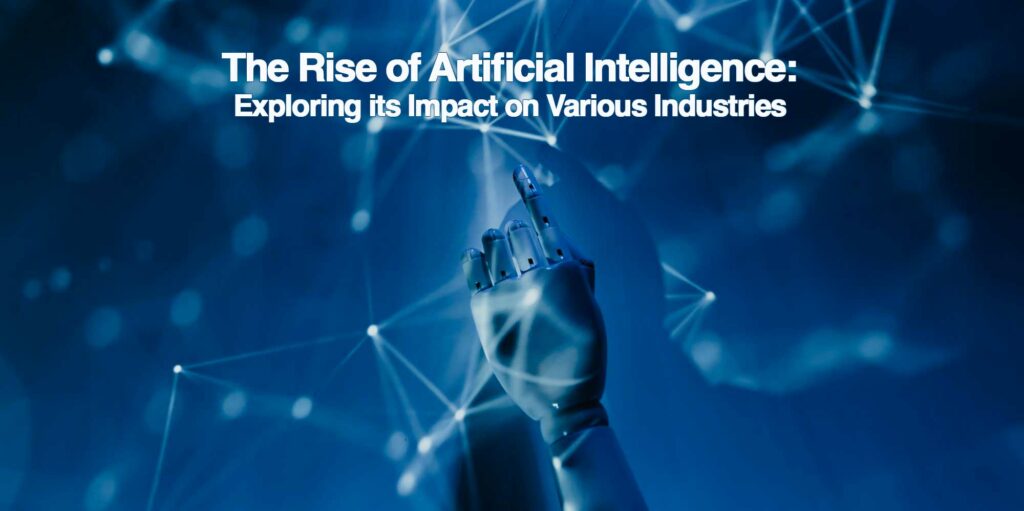It won’t be an exaggeration to say that the world of Artificial Intelligence (AI) is truly upon us! AI has emerged as one of the most transformative technologies of the 21st century, and it has already permeated our daily lives, often without us even noticing. Whether through virtual assistants like Siri and Alexa, the emergence of self-driving cars, or the personalized recommendations we receive on platforms like Netflix, AI has fundamentally altered how we engage with technology. Especially with advancements in machine learning, natural language processing, and data analytics, AI has permeated various industries, revolutionizing how we work, communicate, and live.
In this blog post, we will delve into the rise of artificial intelligence and its profound impact on various industries. But before we do that, let’s understand the key advantages of AI that make it so popular and impactful across industries.
Key Advantages of AI
- AI is popular among all industries because it enhances efficiency, improves decision-making, and provides personalized customer experiences.
- With its advanced data analysis capabilities and automation potential, AI helps businesses reduce costs and gain a competitive advantage.
- Industries recognize the need to embrace AI to stay relevant and future-proof operations in an increasingly technology-driven world.
- By leveraging AI technologies, organizations can unlock new opportunities, drive innovation, and meet the evolving demands of customers and stakeholders.
These factors collectively contribute to the popularity of AI among all industries as organizations strive to leverage its capabilities to drive success, stay competitive, and meet the evolving needs of their customers and stakeholders.
Understanding the Impact of AI on Various Industries
Healthcare
The healthcare industry has witnessed a significant transformation with the integration of AI.
- From diagnosis to treatment, AI-powered systems have revolutionized patient care. Machine learning algorithms can analyze vast amounts of medical data and identify patterns humans may miss, enabling earlier and more accurate diagnoses.
- AI can also assist in developing personalized treatment plans, considering a patient’s medical history, genetics, and lifestyle factors.
- Moreover, AI-powered robots are used in surgeries, performing complex procedures with greater precision, minimizing the risk of human error.
Finance
The finance industry has embraced AI to streamline processes, improve customer experience, and enhance decision-making.
- AI-powered chatbots and virtual assistants are deployed to handle customer queries and provide personalized recommendations.
- Machine learning algorithms analyze vast amounts of financial data to identify patterns and detect anomalies, aiding in fraud detection and prevention.
- AI also plays a crucial role in algorithmic trading, where it can analyze market trends and make real-time investment decisions.
- Furthermore, AI-powered robo-advisors provide investment advice tailored to individual goals and risk tolerance.
Transportation and Logistics
The transportation and logistics industry has experienced a significant impact from AI-driven innovations.
- AI-powered autonomous vehicles are being developed and tested, promising safer and more efficient transportation. These vehicles can analyze real-time data from sensors and cameras to make split-second decisions, reducing the risk of accidents.
- AI algorithms are also used to optimize routes, leading to improved fuel efficiency and reduced emissions. In the logistics sector, AI enables predictive analytics for supply chain management, allowing companies to anticipate demand, optimize inventory, and enhance overall operational efficiency.
Retail
AI has revolutionized the retail industry, transforming how businesses interact with customers and manage operations.
- Chatbots and virtual assistants powered by AI provide personalized customer support, assisting shoppers in finding products and making purchase decisions.
- AI algorithms analyze customer data, such as browsing history and purchase patterns, to offer tailored product recommendations and promotions.
- Furthermore, AI-powered systems are utilized for inventory management, demand forecasting, and pricing optimization, helping retailers streamline operations, reduce costs, and enhance customer satisfaction.
Manufacturing
The manufacturing industry has embraced AI to improve efficiency, productivity, and quality control.
- AI-powered systems monitor and analyze sensor data in real-time to detect anomalies and predict equipment failures, enabling predictive maintenance and reducing downtime.
- Machine learning algorithms optimize production processes by identifying bottlenecks and suggesting process improvements.
- Furthermore, AI-driven robotics and automation are revolutionizing assembly lines, enabling faster and more accurate production while reducing the need for human intervention. With the integration of AI, manufacturers can achieve higher productivity, better quality control, and cost savings.
Education
AI can transform education by personalizing the learning experience and providing adaptive instruction.
- AI-powered systems can analyze student data, such as learning styles and performance, to tailor educational content and activities to meet their needs.
- Intelligent tutoring systems can provide real-time feedback and guidance, enhancing student engagement and understanding.
- Moreover, AI-powered chatbots and virtual assistants can assist with administrative tasks, answer student queries, and provide support outside traditional classroom hours.
- AI in education has the potential to unlock personalized and inclusive learning experiences for students.
In conclusion, the future of AI is full of endless possibilities. As AI continues to advance, it will be crucial for organizations to embrace this technology and adapt to the changing landscape.
Key Takeaway
“AI has the potential to improve our lives in numerous ways.”
While the benefits of AI are clear, there are also important ethical and societal implications that must be considered. Privacy, security, and job displacement are just a few of the challenges that come with the increasing use of AI. We must address these concerns proactively and work to ensure that AI is used for the betterment of society.
Overall, the rise of AI presents a future of unprecedented possibilities, where intelligent machines collaborate with humans to create a better world.






